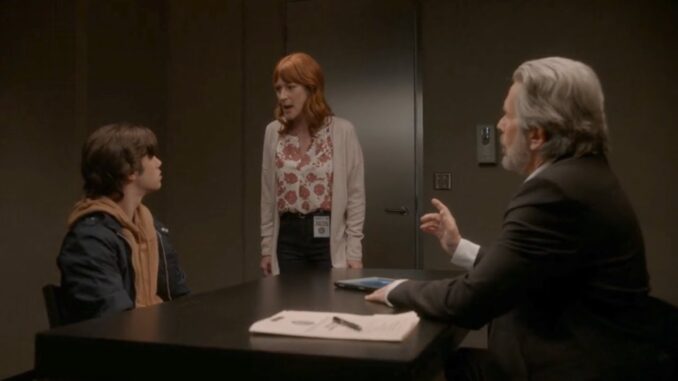
In the vast landscape of crime procedurals, the interrogation room is typically a crucible of tension, a stark arena where truth is wrung from lies through sheer force of will or cunning psychological plays. It’s a place of hushed intensity, dramatic revelations, and often, grim despair. Yet, amongst the myriad of shows that delve into the darkness of human nature, NCIS stands as a curious outlier. Only NCIS could transform the high-stakes interrogation into something surprisingly funny and remarkably relatable, defying convention not despite but because of its eccentric characters and their utterly unique methods.
The humor in an NCIS interrogation often stems from the sheer clash of personalities, a comedic ballet of quirks against the backdrop of grave accusations. At the center is Leroy Jethro Gibbs, whose interrogation technique often involves less speaking and more staring. His legendary silence, punctuated by a sudden head-slap to an uncooperative agent or a perfectly timed sip of coffee, is more an act of psychological warfare than a conventional interview. It's funnier because it's so unexpected, so contrary to the dramatic pronouncements of other TV detectives. Witnessing a hardened criminal squirm under Gibbs's unblinking gaze, desperately filling the silence with their own unraveling lies, becomes a masterclass in comedic discomfort.
Then there’s the supporting cast, each a finely tuned instrument in this symphony of quirks. Tony DiNozzo, with his endless supply of pop culture references and a penchant for playing the overly affable (and often clueless) good cop, injects a lighthearted absurdity that disarms suspects and entertains viewers simultaneously. Ziva David, with her literal interpretations and deadpan delivery of foreign proverbs, often adds an unexpected layer of dry wit or surprising insight. McGee, earnest and often flustered, tries his best to maintain a tough facade, only to be effortlessly manipulated or teased by his colleagues, creating moments of endearing awkwardness. The internal banter amongst the agents, even during a serious interrogation, mirrors the sort of jocularity one might find in any tight-knit workplace, albeit one where the stakes involve national security. It’s the kind of humor that comes from genuine character chemistry, not forced punchlines, making it inherently more organic and, well, funnier.
But beyond the overt humor, NCIS interrogations resonate because they tap into a deeply relatable human experience: the frustration of trying to get a straight answer from someone. Who hasn't felt the urge to give a recalcitrant colleague the "Gibbs stare" or to use Tony's method of overwhelming a difficult person with seemingly irrelevant chatter? The suspects themselves, whether genuinely bewildered, defiantly uncooperative, or pathetically attempting to concoct a believable lie, mirror the various archetypes we encounter in daily life. There’s the person who over-explains, the one who deflects, the one who tries to charm their way out, and the one who simply shuts down. The NCIS team, in their pursuit of truth, navigate these human foibles with a mix of exasperation, cleverness, and sometimes, a surprising touch of empathy, transforming what could be a cold, clinical process into a microcosm of human interaction.
Furthermore, NCIS rarely relies on the standard "good cop/bad cop" routine. Instead, they employ a range of unconventional "methods" that are both hilarious and strangely effective. Ducky Mallard, the eccentric medical examiner, might join an interrogation, not to intimidate, but to impart a rambling, often morbid, anecdote that somehow, inexplicably, breaks a suspect's resolve. Abby Sciuto, the gothic forensic scientist, might bring in a piece of evidence, not with a flourish, but with a passionate, slightly manic explanation that overwhelms a suspect into confession. These aren't just one-off gags; they are integral to the team's unique, almost familial, approach to their work. It’s relatable because it showcases that sometimes, the most effective way to solve a problem (or get an answer) isn't through force, but through an unexpected angle, a moment of human connection, or even just letting someone talk themselves into a corner.
In essence, NCIS makes interrogation funny and relatable by injecting it with the messy, unpredictable, and often absurd reality of human interaction. It understands that even in the face of grave crimes, people are still people: prone to sarcasm, moments of weakness, and unexpected bursts of truth. By grounding its high-stakes procedural work in genuine character dynamics and a healthy dose of wit, NCIS transforms a potentially grim necessity into a compelling and surprisingly heartwarming spectacle, proving that laughter and relatability can indeed be found even in the most intense of rooms.